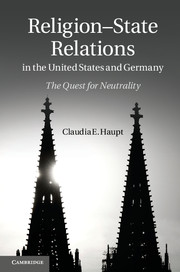4 - Toward neutrality
from Part II - Religion–State Relations and the Role of Neutrality
Published online by Cambridge University Press: 05 January 2012
Summary
This chapter explores the common narrative of state neutrality in several contexts. Reading current cases in the area of religion–state relations in Germany and the United States, one might at first glance think that a form of convergence is at work. Both countries appear to be employing the same principle, namely state neutrality, as an analytical approach to religion–state relations; at least this is what the language in the respective courts’ constitutional analyses would have the casual reader believe. Starting from opposite sides of the religion–state relationship spectrum, it seems that while the degree of separation may be declining in the United States, it is increasing in Germany. Indeed, scholars have asserted a narrowing gap between Germany and the United States on religion–state matters.This chapter investigates whether – and if so, how – this narrowing gap is reflected in linguistic convergence on the principle of state neutrality.
Generally, it may be hypothesized that as Germany is faced with growing religious diversity and trying to accommodate a more religiously heterogeneous population, a different approach than the previously dominant close cooperation between the state and the two large Christian churches becomes necessary. The United States, conversely, is increasingly addressing the challenge of a desire by some parts of the population for a greater degree of incorporation of religious elements into public life. It has been suggested that the shift occurring in the United States is based on the assumption that “excluding religion from public life improperly disadvantages it, and … secularism has no special claim to constitutional legitimacy.” This insight, commentators claim, has long been recognized in Germany. But, as in Germany, there is also increasing pluralism – including both religious diversity and a strong secularist sentiment – in the United States.
- Type
- Chapter
- Information
- Religion-State Relations in the United States and GermanyThe Quest for Neutrality, pp. 79 - 112Publisher: Cambridge University PressPrint publication year: 2011



